
 Gregg Margarite and his crew of gallant Librivoxateers have created another ten tales of SF for the Short Science Fiction Collection series. Most tales in this collection are new to audio, spanning the years 1941 to 1960. The most famous author in this collection is probably Katherine MacLean, she’s got her own wikipedia entry and seems to have a substantial following. But there’s another authoress in this collection who is not as well known. If you’ve seen The Twilight Zone episode called Time Enough At Last you’ll be interested to hear it was adapted from a Lyn Venable short story. She’s got one story in this collection too.
Gregg Margarite and his crew of gallant Librivoxateers have created another ten tales of SF for the Short Science Fiction Collection series. Most tales in this collection are new to audio, spanning the years 1941 to 1960. The most famous author in this collection is probably Katherine MacLean, she’s got her own wikipedia entry and seems to have a substantial following. But there’s another authoress in this collection who is not as well known. If you’ve seen The Twilight Zone episode called Time Enough At Last you’ll be interested to hear it was adapted from a Lyn Venable short story. She’s got one story in this collection too.
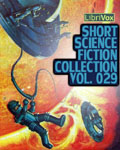 Short Science Fiction Collection 029
Short Science Fiction Collection 029
By various; Read by various
10 Zipped MP3 Files or Podcast – Approx. 2 Hours 39 Minutes [UNABRIDGED]
Publisher: LibriVox.org
Published: October 21, 2009
Science Fiction is speculative literature that generally explores the consequences of ideas which are roughly consistent with nature and scientific method, but are not facts of the author’s contemporary world. The stories often represent philosophical thought experiments presented in entertaining ways. Protagonists typically “think” rather than “shoot” their way out of problems, but the definition is flexible because there are no limits on an author’s imagination. The reader-selected stories presented here were written prior to 1962 and became US public domain texts when their copyrights expired.
Podcast feed:
http://librivox.org/bookfeeds/short-science-fiction-collection-029.xml
iTunes 1-Click |SUBSCRIBE|
 The 4-D Doodler
The 4-D Doodler
By Graph Waldeyer; Read by Gregg Margarite
1 |MP3| – Approx. 34 Minutes [UNABRIDGED]
Publisher: LibriVox.org
Published: October 21, 2009
The Professor’s head, suspended above the body, glared about. The mouth moved rapidly— From Comet, July 1941.
 The Carnivore
The Carnivore
By Katherine MacLean; Read by tabithat
1 |MP3| – Approx. 12 Minutes [UNABRIDGED]
Publisher: LibriVox.org
Published: October 21, 2009
Why were they apologetic? It wasn’t their fault that they came to Earth much too late. From Galaxy Science Fiction October 1953. Written under the pseudonym “G.A. Morris.”
 Homesick
Homesick
By Lyn Venable; Read by tabithat
1 |MP3| – Approx. 00:13:56 Minutes [UNABRIDGED]
Publisher: LibriVox.org
Published: October 21, 2009
What thrill is there in going out among the stars if coming back means bitter loneliness? From Galaxy Science Fiction December 1952.
 Longevity
Longevity
By Therese Windser; Read by Bellona Times
1 |MP3| – Approx. 5 Minutes [UNABRIDGED]
Publisher: LibriVox.org
Published: October 21, 2009
A morality tale—1960 style. From Amazing Science Fiction Stories May 1960.
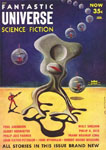 Lost In The Future
Lost In The Future
By John Victor Peterson; Read by Wendel Topper
1 |MP3| – Approx. 7 Minutes [UNABRIDGED]
Publisher: LibriVox.org
Published: October 21, 2009
Did you ever wonder what might happen if mankind ever exceeded the speed of light? Here is a profound story based on that thought—a story which may well forecast one of the problems to be encountered in space travel. From Fantastic Universe January 1954.
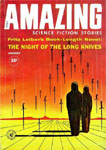 Man Made
Man Made
By Albert R. Teichner; Read by Bellona Times
1 |MP3| – Approx. 25 Minutes [UNABRIDGED]
Publisher: LibriVox.org
Published: October 21, 2009
A story that comes to grips with an age-old question—what is soul? and where?—and postulates an age-new answer. From Amazing Science Fiction Stories January 1960.
 The Mathematicians
The Mathematicians
By Arthur Feldman; Read by faith
1 |MP3| – Approx. 9 Minutes [UNABRIDGED]
Publisher: LibriVox.org
Published: October 21, 2009
We gave this story to a very competent, and very pretty gal artist. We said, “Read this carefully, dream on it, and come up with an illustration.” A week later, she returned with the finished drawing. “The hero,” she said. We did a double take. “Hey! That’s not the hero.” She looked us straight in the eye. “Can you prove it?” She had us. We couldn’t, and she left hurriedly to go home and cook dinner for her family. And what were they having? Frog legs—what else? From Amazing Stories Oct.-Nov. 1953.
 McIlvaine’s Star
McIlvaine’s Star
By August Derleth; Read by Gregg Margarite
1 |MP3| – Approx. 24 Minutes [UNABRIDGED]
Publisher: LibriVox.org
Published: October 21, 2009
McIlvaine sat down to his machine, turned the complex knobs, and a message flamed across the void. From If Worlds of Science Fiction July 1952.
 Stopover Planet
Stopover Planet
By Robert E. Gilbert; Read by Barry Eads
1 |MP3| – Approx. 16 Minutes [UNABRIDGED]
Publisher: LibriVox.org
Published: October 21, 2009
Early morning deliveries were part of the Honeychile Bakery Service. But on this particular morning the service was reversed! From Imagination Stories of Science and Fantasy August 1953.
 Trees Are Where You Find Them
Trees Are Where You Find Them
By Arthur Dekker Savage; Read by Barry Eads
1 |MP3| – Approx. 14 Minutes [UNABRIDGED]
Publisher: LibriVox.org
Published: October 21, 2009
The trees on Mars are few and stunted, says old Doc Yoris. There’s plenty of gold, of course—but trees can be much more important! From If Worlds of Science Fiction November 1953.
[Thanks also to Wendel Topper and Lucy Burgoyne ]
Posted by Jesse Willis


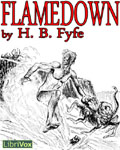
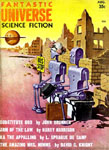


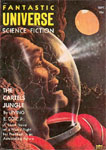 The Long Voyage
The Long Voyage










 The Martian Chronicles
The Martian Chronicles